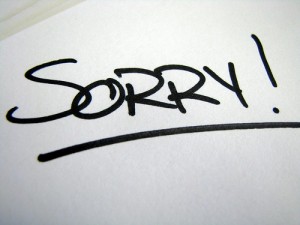 Tiger Woods delivering his 13-minute speech was finally what hundreds of millions of people were waiting to hear. “I know I have bitterly disappointed all of you,” said Woods. “I have made you question who I am and how I could have done all the things I did. I am embarrassed I have put you in this position. For all that I have done, I am deeply sorry. I have a lot to atone for.”
Tiger Woods delivering his 13-minute speech was finally what hundreds of millions of people were waiting to hear. “I know I have bitterly disappointed all of you,” said Woods. “I have made you question who I am and how I could have done all the things I did. I am embarrassed I have put you in this position. For all that I have done, I am deeply sorry. I have a lot to atone for.”
Tiger screwed up, and he finally was doing what anyone who screws up badly should do; take ownership for your mistakes, and let people know what you plan to do to fix them.
As responsible salespeople, we can learn from Tiger’s example. On occasion, we’re going to screw up an order, type in a wrong seat number, forget some paperwork, or fail to follow up with a phone call we promised to make. Rather than run and hide, the sooner we can recognize our mess-up, the better off everyone will be.
– Be honest with your clients, no matter what. It’s hard enough to try to remember what your ‘story’ was for each person you sell, so make it easy on yourself: Tell the Truth. It really does set you free.
 – If you make a mistake, do your best to make it right immediately. The longer a problem festers, the larger the problem will be in the mind of the customer. During a recent 5-day cruise I took with my family out of Miami, the cruise company kept hundreds of us outside on the pavement adjacent to the boarding area for several hours, without telling us why we couldn’t board the ship. I was furious, and it was two days before we had anyone from customer service address the issue with us. I had a chip on my shoulder during the entire cruise, and even though everything else was great, I still have a negative vibe about that cruise line.
– If you make a mistake, do your best to make it right immediately. The longer a problem festers, the larger the problem will be in the mind of the customer. During a recent 5-day cruise I took with my family out of Miami, the cruise company kept hundreds of us outside on the pavement adjacent to the boarding area for several hours, without telling us why we couldn’t board the ship. I was furious, and it was two days before we had anyone from customer service address the issue with us. I had a chip on my shoulder during the entire cruise, and even though everything else was great, I still have a negative vibe about that cruise line.
– Find out what the client would prefer to do to make it right. Sometimes your solution isn’t the one that your client would prefer. In the radio advertising business, on occasion we’d run the wrong commercial on the air for a client. When we discovered the error, our responsibility would be to call the client to let them know, and to try to make amends. We learned over time that if we asked our clients, ‘What do you think is fair as compensation for this mistake?’, we had much happier clients than if we tried to figure out what would be fair on our own. Learn what would make the client feel special, and if you can say yes, then do it right away.
– Take ownership of the mistake. Don’t blame any other departments or air your team’s dirty laundry to others. Pointing fingers serves no purpose, and only makes the team look worse – and those are the kinds of negative word-of-mouth stories that travel fastest.
– Don’t make yourself a hero at the expense of others around you. There is no victory in being number one in sales in your office if you also hold the title of Public Enemy number one to your service staff for having to clean up after you time after time. Promise only what you can personally deliver, and partner with others in your organization to help with the rest.
If you do things right the first time, you’ll have very little to apologize for and you can be a hero to your clients and your co-workers far more often.
###

